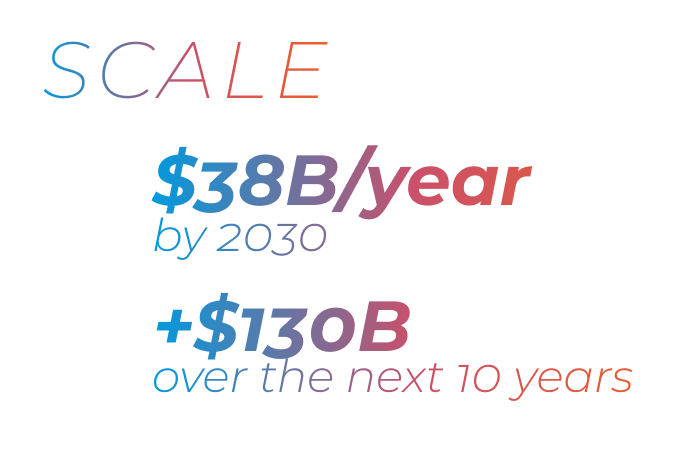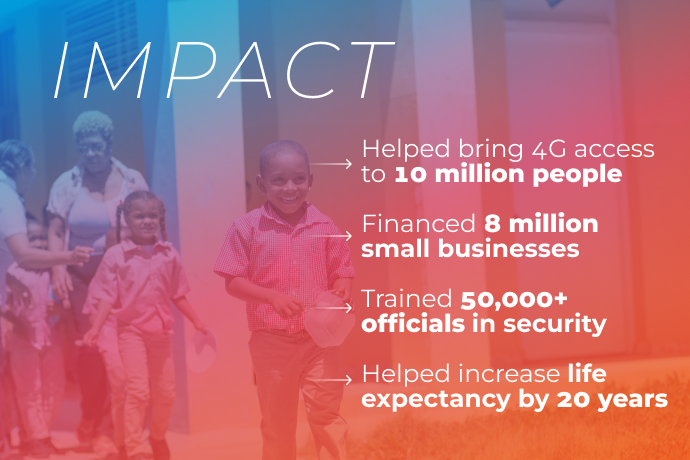The IDB Group’s Bang for the Buck in Latin America and the Caribbean
Imagine making a $1 investment in the present and future of Latin America and the Caribbean and unlocking multiples of that amount – while delivering concrete impact on the lives of millions of people. That’s what the Inter-American Development Bank Group (IDB Group) aims to achieve, with a greater focus on the private sector than ever.
For 65 years, the IDB Group has been the largest development bank and the partner of choice for economic, social, and institutional development in Latin America and the Caribbean. Cumulatively, through our more affordable lending rates, cofinancing, and an expanding suite of tools, we’ve financed and mobilized about half a trillion dollars since our founding. Our lending is several times the amount originally capitalized by our member countries through bond placements in the market. The IDB is financially self-sustaining, with our administrative costs, grants, and concessional terms funded with our own income – not through annual contributions from our member countries’ taxpayers. We have been not just a bank, but a knowledge bank, using the rigor and reach of our expertise to improve projects and policies across the region. We’re deeply embedded in every country where we work, with much of our staff in the field and robust offices across our member countries. Recognizing the vital role of private-sector-led growth in sustainable development, including through innovation, we created two dedicated entities: IDB Invest, to directly finance the private sector in our 26 borrowing member countries, and IDB Lab, to support entrepreneurship and innovation. Over the years, our efforts have helped lift tens of millions of people out of poverty, extended infrastructure and energy across the region, and lengthened life expectancy by about two decades. The benefits go beyond the region’s borders, too. In promoting prosperity and stability in Latin America and the Caribbean, we do the same across the hemisphere and beyond – such as by creating new business opportunities and helping root people in their communities. Our investments also strengthen the region’s role as a solutions-provider for shared, global challenges, such as energy needs and natural capital.
The Path to Scale … But today, the fundamental question is one of scale and impact. We need to boost both to address development-financing requirements several orders of magnitude greater than in the past. Despite our work and that of our member countries and partners, the region is still grappling with high levels of poverty, inequality, and organized crime, with the world’s highest homicide rate. That’s where our IDBImpact+ approach comes in. Approved by our Boards of Governors last year, it mandates three transformational changes to the way we work – to redefine what delivering results look like. In 2024, we approved about $13 billion in sovereign-guaranteed lending to the public sector of Latin America and the Caribbean. Today, we’re on track to increase that figure to $19 billion by 2030, reaching $50 billion of additional lending capacity over a decade. Behind the increase is an optimized IDB balance sheet, exposure-exchange agreements, guarantees, and other initiatives to make our capital go farther. But that’s only half the story. Seminal changes are underway.
… Runs through the Private Sector Today, we’re becoming a truly private-sector-oriented IDB Group, with almost half of our financing going through our private-sector arms, as we leverage our decades of experience working with governments in the region.
One of our IDBImpact+ transformations is a capital increase for IDB Invest that is paired with a new business model – a flagship initiative called the “originate to share” model. In simplest terms, IDB Invest identifies and starts (originates) investment opportunities with significant development impact. It then offers (shares) parts of these investments to commercial investors, while keeping skin in the game. This is a recipe for freeing up our capital, investing in more projects, and, crucially, crowding-in more private resources. In fact, these changes will double our firepower to drive development through the private sector. The success of one of our first such projects was notable: in a $1 billion securitization deal across 20 countries, we sold $100 million to investors and unlocked up to $500 million in new lending. We aim to replicate such deals, continue reinvesting, and keep crowding-in private capital in the years to come. There are other means we’ve begun to employ. So far, we’ve leveraged more than $23 billion through blended financing, and we’re increasing IDB Invest’s equity capacity fivefold. That will allow us to support more early-stage projects where debt isn’t an option – aligning more private capital for the public good. And we’re introducing more risk-sharing options and other tools to soften the risks of investing, all to tap a level of financing that the public sector can’t muster alone. Our goal is imminently doable: to mobilize multiple times the amount that we contribute to projects that improve lives. In fact, if we total our public- and private-sector work, we’re on the way to supporting the region with $38 billion annually by 2030, reaching an additional $130 billion over the next decade.
Where Public and Private Meet We also play a critical role at the juncture between the public and private sectors. The IDB’s work with government institutions in the region is essential to create an environment that enables the private sector to lead growth and development. We finance programs that create jobs and train prospective workers. Our financial and technical support for institutional and regulatory reforms, including our work to increase transparency and tackle crime, bolster stability, predictability, and the rule of law. These are essential “upstream” ingredients. So, too, are the modern infrastructure and reliable electricity that we fund. One of our latest initiatives, based on a platform for hedging local-currency volatility, will take a highly successful project in Brazil and bring it to other countries and regions to help overcome one of the oldest and most pressing barriers to private investment.
A Sum Greater than Its Parts Regional programs are in our DNA. As a multilateral institution with 48 member countries – 26 from Latin America and the Caribbean, along with the United States, Canada, and countries in Europe and Asia – it’s natural for us to foster economic integration to boost development standards for the benefit of people. Amazonia Forever is one of our most successful, holistic umbrella programs, which recognizes that defending nature requires offering alternative economic opportunities and living conditions to the population of the Amazon region. It is based on five pillars: (1) combating deforestation and strengthening environmental institutions; (2) the bioeconomy and the creative economy; (3) people; (4) cities and resilient infrastructure; (5) sustainable and resilient agriculture, livestock, and forestry. We hear the demands of our members. Last year, they demanded we unite against violence – in particular, organized crime. We did not shy away from our responsibility, launching the Alliance for Security, Justice, and Development that 22 countries and 11 organizations rapidly joined. Today, regional integration is perhaps better than trying to achieve full global integration. That’s why we created ONE Caribbean, a program that unites our Caribbean member countries in same way that our América en el Centro and South Connection programs foster integration in Central and South America. We are only as strong as our weakest link, and we are there for our most vulnerable member countries in this spirit. We have led strong support for Haiti through $670 million in grants over the last five years – including $200 million in the last year alone. In addition to mobilizing resources from other sources, we are coordinating the Medium-Term Recovery and Development Plan, in partnership with the World Bank, the UN, and the EU. This Haitian-led plan focuses on three priorities: creating jobs and supporting private-sector-led growth; expanding access to basic services and investing in human capital; and strengthening institutions, justice, and security.
More than the Sum, It’s about Impact But for development, monetary sums are only as important as the real benefits they produce. The IDB Group’s true “bang for the buck” is not just the number of dollars we lend, but the number of lives we change.
In recent years, our investments have helped bring at least 4G mobile connectivity to more than 10 million people. We’ve trained more than 50,000 public officials in citizen security and justice. And we’ve financed nearly 8 million small businesses – the backbone of the region’s economies. Our new Impact Framework includes quantitative targets to reflect our increased ambition and measure progress over time – holding us more accountable and enabling a more stringent and strategic selectivity in determining what, and how, we finance. In our role as a knowledge bank, we produce and disseminate the research and lessons learned that are essential for generating impact. Our countries and clients use these non-financial assets independently, or in technical cooperation with us, to shape their own initiatives and align with best practices, an added value that is often unseen, but vital. And we use them internally to inform better project design for better results. As we scale up – and unlock the private sector’s potential – we’re ensuring that impact rises in tandem. It’s our promise to our borrowing and non-borrowing members, alike. In today’s world, a dollar only goes so far. But a dollar in the hands of the IDB Group goes much farther. |


